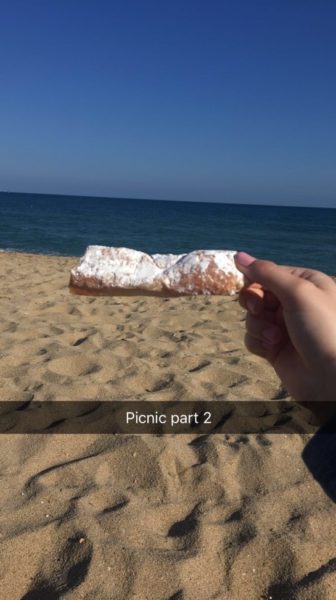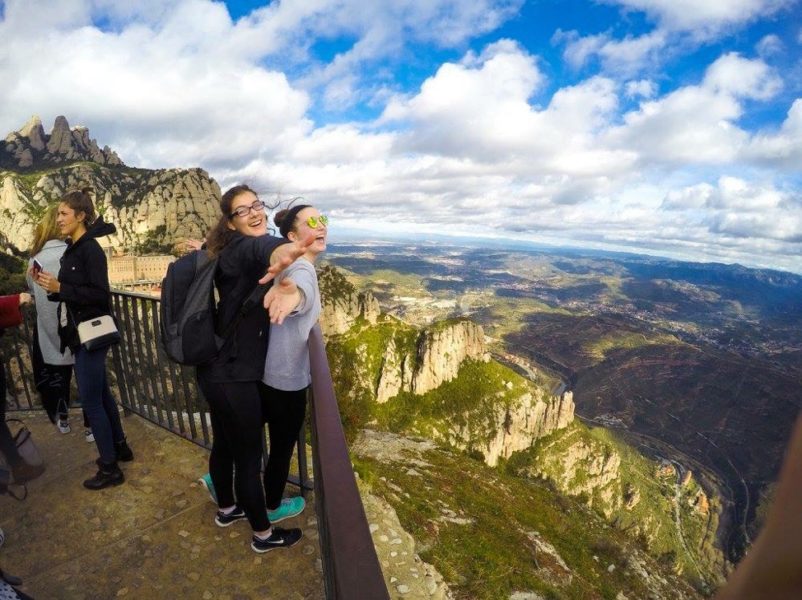I studied abroad in Barcelona, Spain with AIFS Spring of 2017. During the four months of my program, I traveled to 11 other countries. The abundance of cheap flights made this largely possible. However, there were still plenty of costs associated with my frequent trips. Lodging, for one, was always a necessity. There were also meals, which I was not inclined to miss. And finally, there were all of the things I wanted to buy and do. Being on a relatively-tight budget though meant I had to find ways to cut costs whenever possible.
I picked up a few tricks to save money while traveling as the semester went on, and by the end, I was an old pro at using my funds as efficiently as possible. Here’s what I learned:
1. Hostels are a student traveler’s best friend.
Yeah, movies might make them seem like a horror-show waiting to happen, but in my experience, hostels were the best choice when traveling. For starters, they’re usually a fraction of the cost of any hotel or AirBnb you might find. Try $10-$20/night compared to $50-$100 — they easily saved me hundreds of dollars over the semester!
While the comfort level may vary some from place to place, they always felt as safe as anything else. They also tended to include amenities like city guides, free tour schedules, bike rentals and breakfast. Finally, they were a great opportunity to meet other like-minded travelers. During my stay at a hostel in Munich, my friend and I met some students from Australia and the U.S., and we all ended up going to dinner and taking a tour together. It made for a much more interesting trip. Ultimately, hostels are great to help you save money while traveling and give you many other perks.

2. Picnic meals are charming and affordable.
It’s true, they are! Without having access to a kitchen while you travel, you really don’t have the option to stay in and cook. It’s really easy to fall into the trap of eating out for every meal, but that will add up quick. Rather than head to a restaurant, why not try the closest market instead? My friends and I were big fans of finding a loaf of bread, bit of cheese and whatever else might look good where we were. For a few Euros, we’d easily construct more than a full meal’s worth of sandwiches. We would pack it all up, and spend the day doing whatever we’d planned. Then, whenever we were hungry, we’d find a nice spot to pull out our food and make a meal. So much cheaper than a sit-down restaurant, and it usually offered a better view, too! Packing a picnic is an easy, effective, and delicious way to save money while traveling.




3. Souvenirs aren’t all they’re cracked up to be.
Truly, I don’t regret ever having passed up on a souvenir. That’s not to say that I didn’t buy anything, because I did sometimes. However, when I did, I thought long and hard about whether I really wanted it. More often than not, I’d end up putting back whatever I planned to buy.
A lot of people on my program made a point of collecting a specific souvenir from each country they’d visited, like a pin or a shirt. Initially, I felt like I might be missing out by not doing the same. Now that I’m home though, I cherish the pictures I took for free more than any object I could’ve brought back with me.

4. Walking is good for your body and your bank account.
Taxis, Ubers, and bus and train tickets are all other ways your costs can rapidly rise when you’re on a trip. Instead of relying on these forms of transportation, I walked whenever possible. I even traveled with a backpack instead of a rolling bag, so that I could walk to my hostel from the airport or train station.
If my destination was less than three or four miles away, I almost always opted for my own two feet. Not only did hep me save money while traveling, it also afforded me the opportunity to better see and explore my surroundings. Furthermore, it helped me stay in shape and feel healthy.
5. Free tours and museum days are totally a thing.
Before you go spending your money on all kinds of activities, see what there is to do for free! Almost every city I visited had a number of free walking tours that I was able to easily find by Googling or asking at my hostel. Better yet, the companies that operated these usually had other activities — like food tours or bike rides — for really reasonable prices. This made it super simple to find more to do after. Moreover, lots of museums had certain days or hours where they would be free to either the public or students. One of my fondest pieces of my trips was the hours I spent exploring the Louvre, and I didn’t spend anything to get in.


6. Unplugging is good for your soul and your savings.
International phone plans can be really expensive depending on who your carrier is, so I got a cheap, local sim card to use while I was abroad. However, that was limited to Spain. There were options that gave me data or calling throughout the EU, but those tended to cost quite a bit more. Rather than pay for that too, I chose to unplug for most of my trips. My hostels always had WiFi, so I was able to check in with people each night, but during the day my phone mostly served as my camera. It was nice being able to focus fully on the moment rather than things that were going on outside of my trip.
This post was contributed by Greta Banks, an AIFS Alumni Ambassador from the University of Alabama who spent a spring semester studying abroad with AIFS in Barcelona, Spain.

